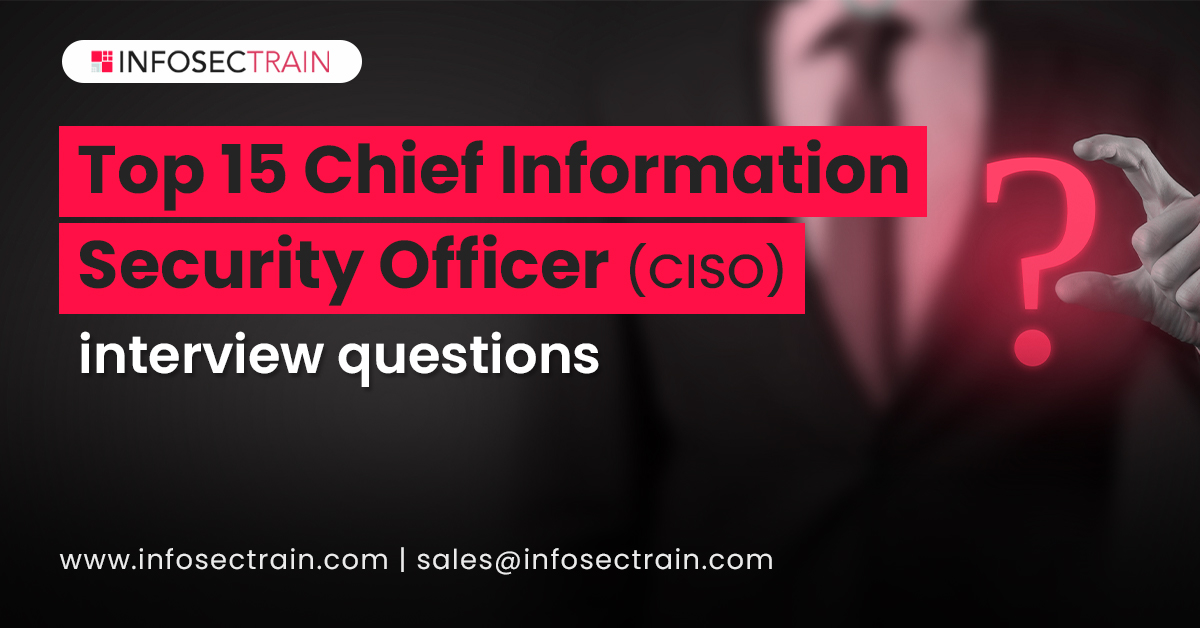Top 15 Chief Information Security Officer (CISO) Interview Questions
C|CISO stands for Certified Chief Information Security Officer. Chief Information Security Officer is the senior-level officer of an organization responsible for establishing and maintaining the strategies for the protection of valuable information assets. C|CISO directs staff to identify, develop, implement, and support processes across the enterprise to reduce IT security risks. Their responsibilities include responding to security incidents, establishing appropriate standards, managing security technologies, and direct the establishment in implementing policies and procedures. CISOs are also usually responsible for maintaining information related compliances and regulations. Typically, their influence reaches the entire organization.

Chief Information Security Officers are highly in demand nowadays. If you are looking forward to becoming a CISO, you have to go through a grueling interview process. Here are some of the frequently asked CISO interview questions and answers that may help you get yourself in the right spot for being hired for this C-level position.
1) Why should we hire you for the chief information security officer position?
Answer: This is a very common question. To answer this question, you do not want to list all of your experience or achievements that you have mentioned on your resume. The interviewer knows these already. You must have the real answer, the accurate answer. It is real-time to sell your skills and also show why you are the mostsuitable candidate for the position.
Example: I possess all the skills and experience that you’re looking for. I am sure that I am the best applicant for this position. Not only my background in the past projects but my skills to effectively manage risks, involving with the business leaders, adaptability, and team spirit, will be applicable in this position.
2) Why do you want to work with us?
Answer: This question explains why you are interested in getting this job and how you have the right skills. This also exhibits to the interviewer your willingness to learn and achieve maximum productivity. In this answer, you should put all the right reasons why you are the right candidate for the position.
Example:I am using your products for many years and am consistently impressed with the innovation. I also appreciate your dedication to providing your customers with free demos to learn how to use your products effectively. I prefer to be a part of this innovative team and utilize my skills to enhance the value of the products.
3) How would you describe your management style?
Answer: This is a tricky question. It isn’t only about management. The interviewer wants to know whether you’ll fit in with their work environment. To answer this question, Think about the management style of previous executives, determine qualities that make you a good manager, decide which type of management style you have, and tell a story about when you used a particular management style.
Example: Leading people is a skill you acquire from listening, explaining expectations, and working with your employees. Treat your employees with respect. A good manager should not attempt to manage his people. He should try to manage their jobs’ daily operations by knowing how their employees are performing and the vision to know where it will lead the team.
4) Tell me about a time when you had to collaborate with stakeholders to establish an Information Security risk management program.
Answer:By this question, the interviewer wants to know that you have experience in cooperating with stakeholders, and you have the ability to work with them in constructing a business information security risk management program that addresses their needs.
Example: When I had joined my previous company, the information security department was newly being set up, so we had meetings with high-level stakeholders to establish our priorities and the different ways in which data needs to be protected.
5) What is your biggest weakness?
Answer: The general advice does not say, “I have no weaknesses.” give a real example and turn your weakness into your strength and not pick a weakness relevant to the job you are applying for.
Example:My inability to say ‘no’ to any work is my biggest weakness, which puts me under stress sometimes. I had to face this situation in my previous jobs. However, my working on it so that I can focus on my own task.
6) How crucialis Security awareness training for your management style?
Answer: Chief Information Security Officer is responsible for information-related complaints, and the purpose of security awareness training is to make all employees aware of information security policies. It helps them deal with problems when they arise and meet the compliance training requirements. So Security Awareness Training can improve the Management Style of a CISO.
Example: A CISO identifies, develops, implements, and supports processes across the enterprise to reduce information and information technology risks. They respond to incidents and control management security technologies, and security awareness training provides an all-important skill necessary for a CISO.
7) If you were going to encrypt and compress data for a transmission, which would you do first?
Answer: The functionality of encryption is to change the message into a different form, and the functionality of compression reduces the size of the message. Let’s say we have data in this same line that is repeating 100 times. When we encrypt it using an encryption algorithm, We will see the same 100 lines in plaintext, but all the lines will be different looking. There will be no repetition of lines. When we pass it through compression, the compression algorithm will consider that these are different lines. Then the compression algorithm will not reduce the size of data. So the functionality of the compression algorithm has not been used.
That’s why compression should be done first, followed by encryption.
8) What is the first question you ask when a breach occurs?
Answer: When a Breach Occurs, the first question you should ask is,”When did the breach happen?”
9) What do you consider to be key attributes of a CISO?
Answer: Key Attributes of a CISO are strong leadership, adaptability, program planning skills, and thorough security knowledge. A CISO also should possess strong communication skills and be focused on self-improvement.
10) Give Me an Example of a New Technology You Want to Implement for Information Security.
Answer: At that time, you can show the top recent information security technology you know. You can give an example to use artificial intelligence or machine learning to help detect security threats.
Example: In my opinion, artificial intelligence and machine learning is the best example of new technology, and we have a lot of machine learning methods such as Support vector machine, Neural network, and random forestby using that we can detect and manage security threats.
11) What challenges are you looking for in this chief information security officer position?
Answer: This is a typical question. The interviewer determines whether you would be a good fit or not for the hired position. To answer this question, you should discuss how you would like to utilize your skill and experience, and you can effectively meet the challenges.
Example: I like to face challenges and learn from them. The biggest challenges are managing the risks, raising awareness about Cybersecurity, creating security programs while adhering to compliances and regulations. I can effectively utilize my skills and experience to meet challenges effectively and have the flexibility to handle a challenging job.
12) We have a board meeting tomorrow. Can you talk about Cybersecurity in a way they will understand?
Answer: CISOs should be able to say “absolutely” to this question confidently. They should speak with the board in a very businesslike way and explain what they are doing with its money and how they are protecting the company and its assets.
Example: Board members identify the growing importance of Cybersecurity, so I will explain the basics about types of attacks and defense. I will discuss the business operations and explain recent cyber threats and how we can protect our organization from them.
13) What field experience do you have for a Chief Information Security Officer position?
Answer: Explain what responsibilities you have during your previous jobs. You can describe what programs you developed and what modules you worked on. You should try to relate your experience with the position you are applying for.
Example: I have been working in the cybersecurity domain since 2009. During these years, I have performed many cyber threat tasks, including formulating security programs, maintaining discussions with the board members, managing Cybersecurity risks, and implementing regulations and compliances within the organization.
14) How would you handle a security risk assessment?
Ans: A security risk assessment identifies and implements security controls in applications, and a CISO is responsible for handling these tasks.By this question, the interviewer checks your technical skills, so give an answer wisely.
Example:For handling security risk assessment, I will follow the following steps:
- Determine information value
- Identify and prioritize assets.
- Identify cyber threats
- Identify vulnerabilities
- Analyze controls and implement new controls
- Calculate the impact of various scenarios on a per-year basis
- Document results in the risk assessment report
15) What kind of salary are you expecting?
Answer:From this question, the interviewer wants to know your expectation, so answer the question honestly.
Example: I am expecting my salary to stay close or higher to my previous job. I am confident that my talents justify the amount.
Wrapping up
The primary job of a CISO is managing the risk and engaging with the business leaders. He must be capable of adapting himself as per the changes in business or threats. A CISO should possess a continuously evolving mindset. Apart from this a strong communication and leadership skills are required for this job position. You must ensure that these attributes are demonstrated by you while giving answers to the CISO panel questions.
If you aspire to become a CISO or already preparing for the CISO interview, you can connect with Infosec Train. We offer a comprehensive training program for CCISO certification, a globally reputed credential validating the skills of current or aspiring CISOs. To check out the latest schedule, kindly follow the link below: CCISO Certification Training







 1800-843-7890 (India)
1800-843-7890 (India)